
Use these meeting effectiveness survey questions to assess the quality of your meetings and gain insightful feedback.
By Fellow.app • September 3, 2021 • 7 min read In this article 7 min read In this article 7 min readMeetings have a profound impact on your team’s performance, satisfaction, and growth. Tracking the efficacy of your meetings can help you measure and reassure that you’re accomplishing your intended goals. By asking these meeting effectiveness survey questions, you can best measure outcomes and make adjustments to improve future team meetings.
Meeting effectiveness survey questions are what you ask attendees after a meeting to see whether everyone present found it to be successful and useful. When you ask these questions, you’re assessing whether the people present felt the meeting was a good use of their time. These post-event surveys should also address the quality of your meeting and how it compares to previous meetings.

Learn from every meeting and set new benchmarks. Use Fellow to ask the right post-meeting questions and steer your meetings towards productive work sessions.
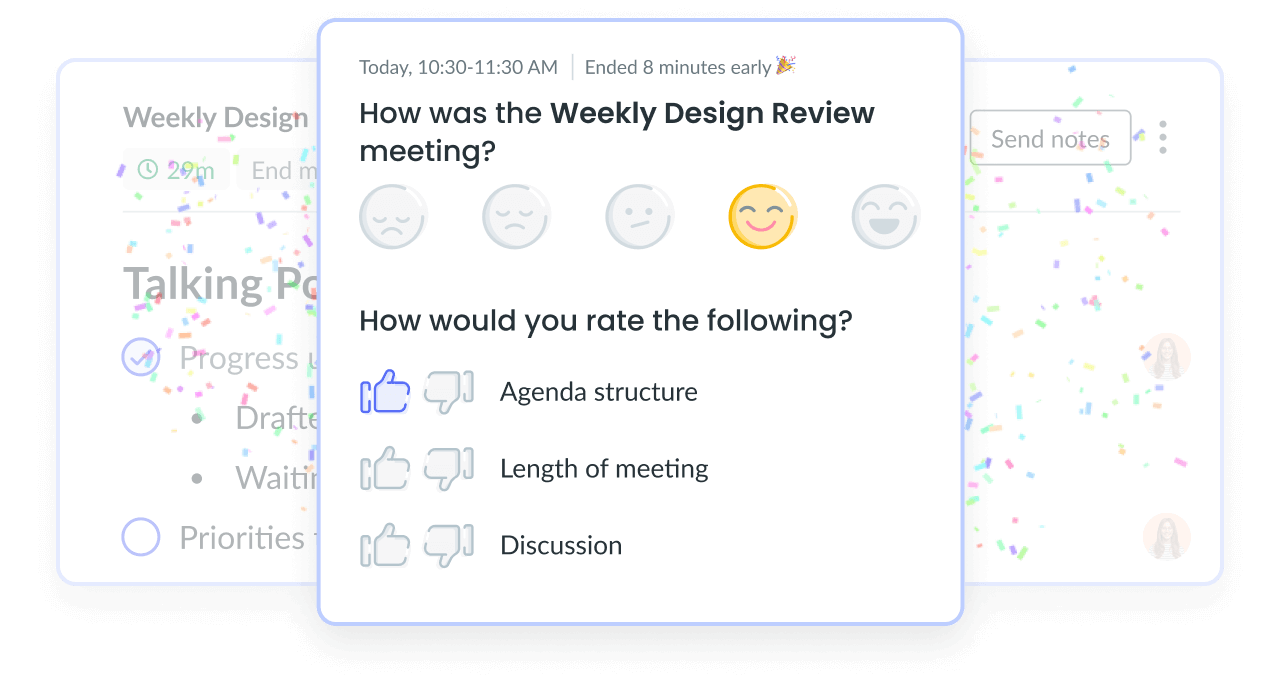
Meeting effectiveness survey questions indicate areas of excellence or improvement for you to, respectively, continue and refine at your next meeting. For example, let’s say your post-event survey results in consistent feedback that reading directly from a PowerPoint presentation was boring and took too much time. You can make your next meeting more effective by adjusting your presentations and speaker notes.
The numbers back this logic. A Gallup study comprising 530 teams that track performance data found a 12.5 percent increase in productivity after implementing meeting surveys. Gallup also looked at another 896 teams and found that employee engagement increased significantly when meeting leaders received and acted on feedback.
Interestingly, Gallup only looked at the effect of positive feedback, which was abundant enough to form the basis of its studies. So if you’re concerned that implementing surveys would annoy your team, worry no more! Plus, with the right survey questions, you’ll get super helpful feedback no matter your strengths and areas of improvement.
Most meeting effectiveness survey questions fall into one of five categories. We’ve outlined these categories below and shared a few example questions for each.
Start top-level with your meeting surveys before digging deeper. Ask the broadest questions you possibly can about the meeting post-event. Seriously – something as general as “Did you enjoy the meeting?” totally works here. The goal is to just read the room and set the stage before finding out why attendees were satisfied or dissatisfied. So with that in mind, ask the below questions:
These questions are more effective with a “Why or why not?” or a space for elaboration attached to its end. This way, you can learn why employees have given their answers to these mostly yes-or-no questions. These notes are important, as they contain vital information that you’ll use to improve future meetings.
Feedback is a gift. When feedback becomes a regular part of the conversation, it becomes normalized. Use this 1:1 feedback meeting template to give and receive feedback, resolve issues, and document actionable next steps. Customize the questions, headings, and talking points to your liking!
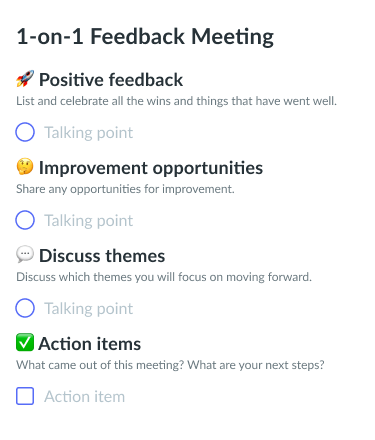
Now it’s time to find out why your team members did or didn’t like your meeting. Begin by asking questions that speak to your meeting’s effectiveness. Namely, seek to find out whether your team feels that you all achieved the goals detailed on your meeting agenda. You can ask questions like:
Keep in mind that, in theory, a meeting can lead to all your goals being achieved while still feeling like a drag. Your focus with this set of questions is primarily to assess whether your meeting’s events matched its intent. You’ll know from the answers to the previous set of questions whether your meeting was effective but boring or exciting but ineffective.
It’s one thing to achieve the goals set in a meeting agenda. It’s another for your team to believe that your meeting, even if it achieved your goals, has you all prepared for peak performance. For example, let’s say you achieve your meeting goal of setting deadlines for your project’s next sprint. What if some team members still feel these goals aren’t realistic? Maybe these team members were afraid to voice their concerns in a room full of people. They might not be as shy when filling out a survey that only you see.
Here, you’ll want to ask questions such as:
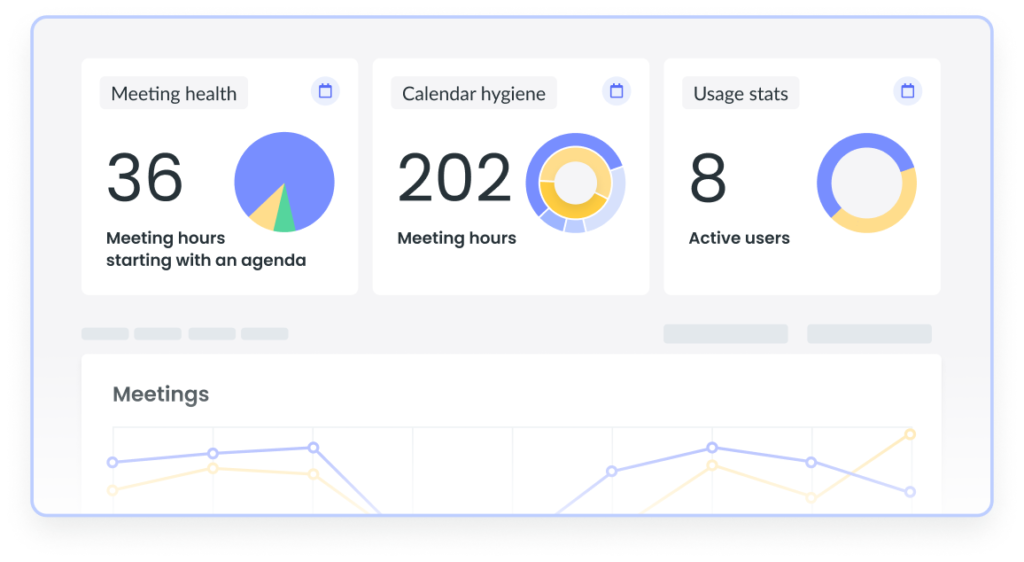
With these questions answered, you’ll be prepared to create more realistic goals for your next meeting agenda. You’ll also know whether what you agreed upon at the meeting will truly be effective or whether contrasting voices were inadvertently left behind.
Ideally, your team will walk away from your meetings feeling confident and motivated to meet team goals. In reality, some meetings can be such a drag that your employees get pushed in exactly the opposite direction. Whether your meeting attendees walk away feeling good or bad, their feelings will be fresh at the meeting’s end, making it a perfect time to get feedback.
Questions you can ask here might include:
As you can tell, these questions can get a bit intense. In cases where you get mostly negative feedback, you might want to arrange for a follow-up one-on-one meeting. These meetings may help the employee feel they have a space to air their concerns when they couldn’t find such a space before. Really, when you provide opportunities for fully honest feedback, keeping employees engaged and happy becomes much less of an uphill battle.
Meetings are important for helping you and your team get on the same page as you work toward shared goals. Planning for these goals can involve educating your team members on certain new skills and processes. When you look at meetings this way, you can frame them as opportunities for personal and professional development and growth.
Perhaps you’ll find that your team wants time during your weekly meetings to simply speak with other team members. That’s an understandable ask – we’ve all worked in environments where tasks get in the way of actually bonding with our colleagues. Meetings can be especially apt spaces for forging these connections since they aren’t concurrent with tasks. A five-to-10-minute “networking” session at the beginning can help build valuable bridges among your team.
The questions we recommend here are simply suggestions to set you in the right direction. You can – and should – adjust them to your industry, products, services, goals, the roles of the team members present, and more. To do so, just keep the below tips in mind:
In today’s fast-paced work environment, effective meetings are crucial for team success, and meeting feedback becomes the pinacle for continuous improvement. Using Fellow’s comprehensive feedback features, teams can effortlessly gather actionable insights and feedback post-meetings, paving the way for more engaging and productive future sessions with the click of a button.
This feedback then becomes a cornerstone for not only assessing the effectiveness of the meeting but also for enhancing meeting structures, content, and delivery moving forward. Fellow simplifies this process, making it easy for teams to integrate continuous feedback into their meeting routines, ultimately boosting team collaboration, satisfaction, and performance.
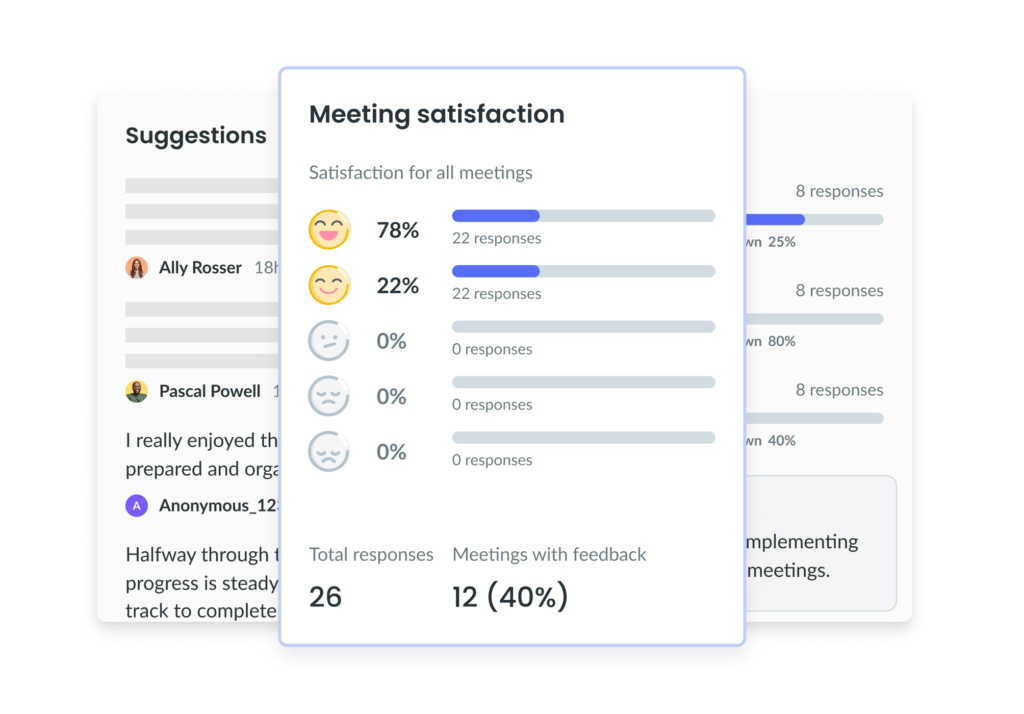
Meeting effectiveness survey questions get you thorough feedback, but they aren’t solutions to problems. Taking those actions is the obvious next step, though doing so can be challenging without tools to organize your feedback and facilitate your meetings. Here at Fellow, our workspace analytics and guidance tools let you collate feedback and plan one-on-ones. You’ll be better prepared to act on employee feedback today and hold your best meetings tomorrow.
Get leadership, productivity and meeting insights.
Fellow is the only all-in-one AI meeting transcription and management software for remote and hybrid organizations. Have fewer, more effective meetings with the help of AI, productivity-driving features, and seamless integrations.
Get Started Free
Last Updated, 09/03/2021Fellow is the only all-in-one AI meeting transcription and management software for remote and hybrid teams. Have fewer, more effective meetings and 1-on-1s with AI, behavior-driving features, and seamless integrations.
Fellow is the only all-in-one AI meeting transcription and management software for remote and hybrid teams. Have fewer, more effective meetings and 1-on-1s with AI, behavior-driving features, and seamless integrations.
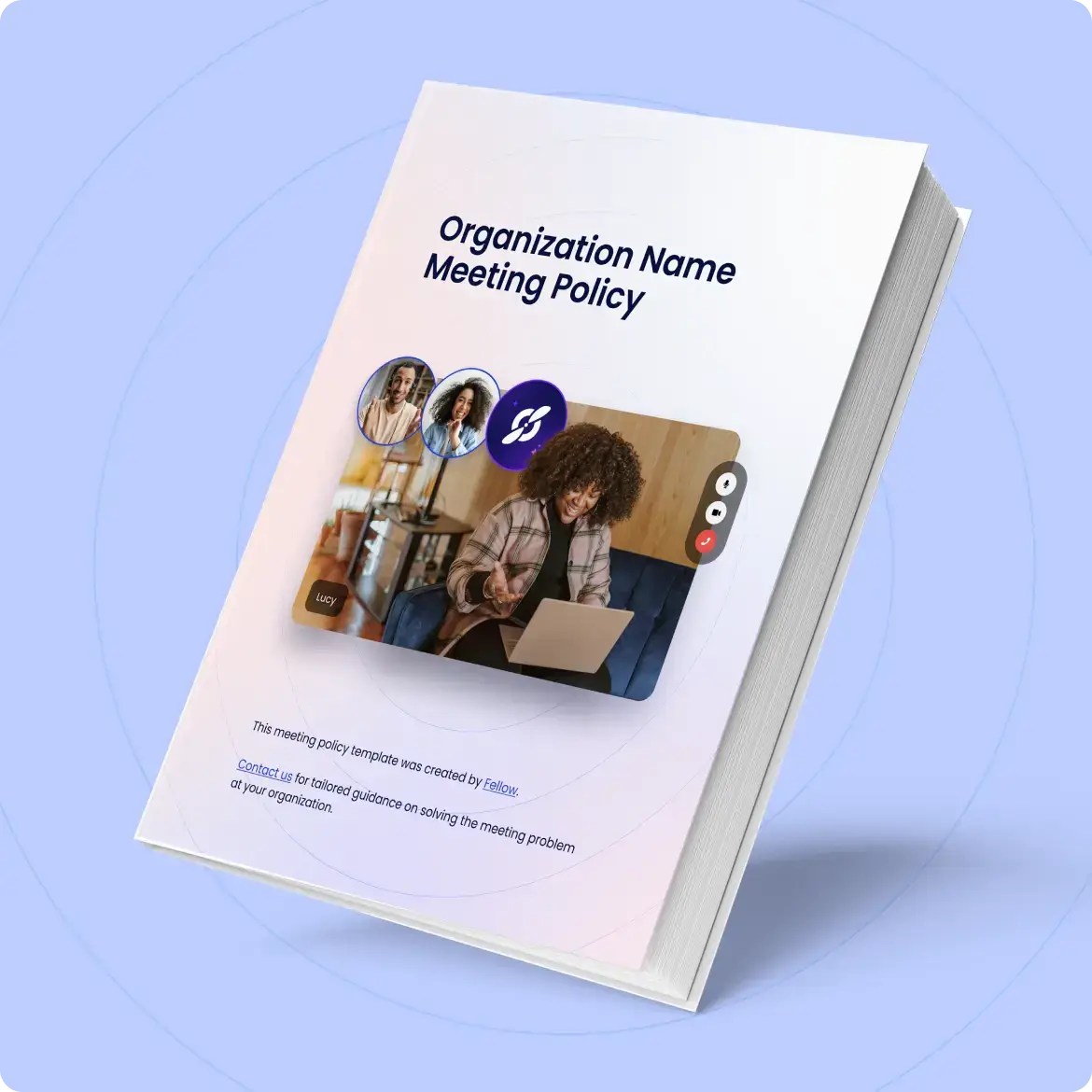
Lead your company in reducing meeting fatigue with this customizable meeting policy template, pre-loaded with guidelines to improve meeting culture.